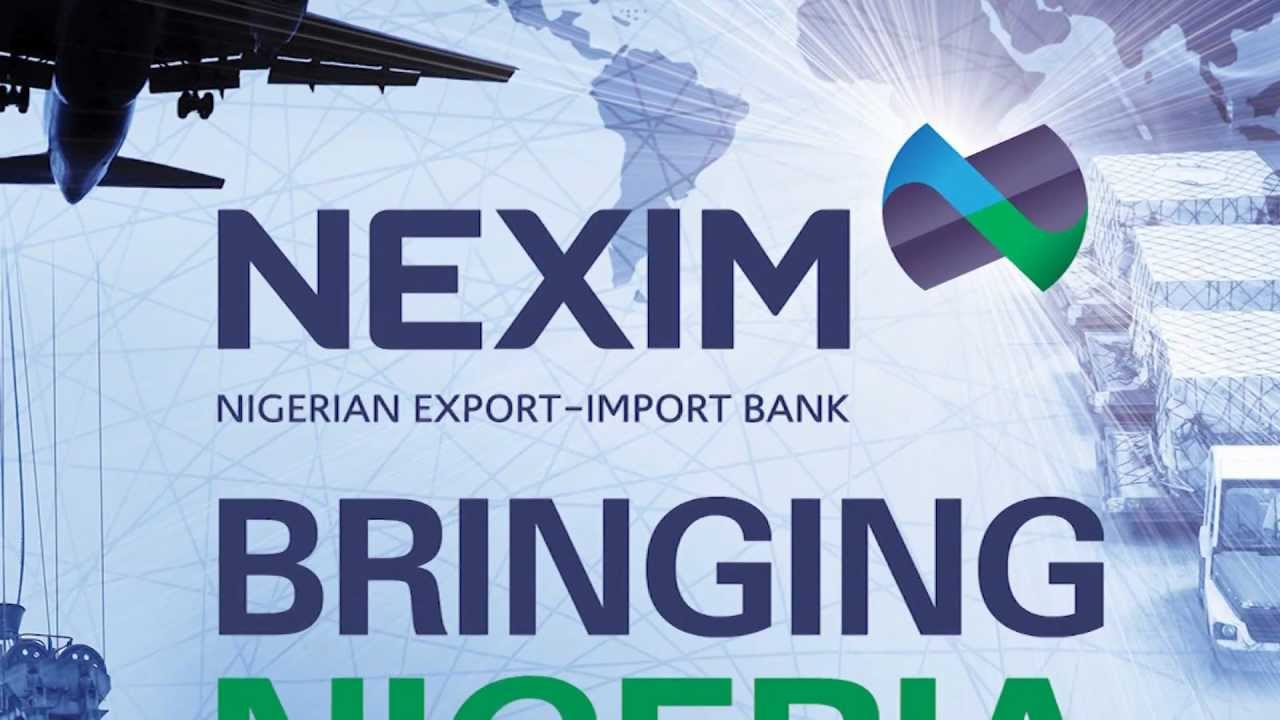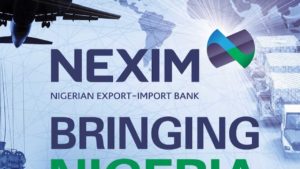Economy
Reps Commend NEXIM Bank’s Support for Local Firms


By Dipo Olowookere
The relentless contributions being made by NEXIM Bank to the Nigerian non-oil export sector, especially in funding factories have received the recommendation of the House of Representatives.
Chairman, House Committee on Banking and Currency, Mr Jones Chukwudi Onyereri, during a recent visit to Ladgroup Ltd, a foremost indigenous Nigerian conglomerate with a state of the art oil mill extraction factory located in Ikenne, Ogun State, said the bank has contributed to the growth of the country’s economy.
He appealed to the Federal Government to increase funding support to institutions like NEXIM Bank, promising that his committee will continue to do all within its jurisdiction and mandate to ensure that such funds are applied very judiciously.
The lawmaker, who led other members of the committee to the factory on oversight function, noted that, “The current economic recession facing the country has opened our eyes to the immense opportunities and abundant blessings God has heaped on Nigeria, not just in oil and gas, but more especially in agriculture and solid minerals.”
Also speaking during the visit, the Acting MD/CEO of NEXIM Bank, Mr Bashir Wali, revealed that the bank had in March 2015 approved the sum of $5.8 million to Ladgroup Limited to set up a Shea Nut processing factory.
He said the facility was made up of Equipment Finance of $2.8 million and Working Capital Facility of $3 million and has enabled the company to purchase and install a Shea Butter Refining Unit, a step down transformer and augment its working capital base.
According to Mr Wali, “The interest of NEXIM Bank in Shea Nut processing for export was borne out of the very high demand for Shea Butter with the impressive potentials for foreign exchange revenue stream as well as massive job creation at various levels of its value chain.”
Citing available statistics, he said nearly 2 billion Shea trees grow naturally on parklands in 21 African countries stretching from Senegal to South Sudan with more than 16 million women living in rural communities individually collecting the fresh fruits and the kernel which they process to extract a healthy vegetable oil known as “Shea Butter.”
With approximately 600,000 tons collected each year, the industry provides a critical source of jobs and incomes to millions of often poor and underserved communities.
Mr Wali stated that the global demand for Shea Butter is worth about $10 billion and is projected to be more than $30 billion by 2020, hence the interest of NEXIM in providing funding for increased proactive measures to reposition agricultural products such as Shea as part of its non-oil export sector interventions in the agro-processing sub-sector.
According to him, it has been estimated that over 680,000 metric tons of Shea Nuts are produced annually in West Africa, with about 56 percent of the nuts exported, while the remaining is consumed locally.
Available data shows that Nigeria is the world largest producer of Shea with the wildly grown Shea trees predominant in 21 states across the country.
This accounts for over 53 percent (or 370,000 MT) of the production in West Africa as confirmed by the reports of the Central Bank of Nigeria (CBN) and Oil Seeds Association of Nigeria (OSAN).
Sadly, nearly N345 million is lost in the smuggling of Shea products out of the country every year.
Chairman of Ladgroup Ltd, Mr B. A. Onafowokan, expressed immense appreciation to NEXIM Bank for the quality of loan given to his company, and also thanked the lawmakers for their ‘oversight function’ stating that more of such activities is required to curtail misapplication of such funds provided by the government to assist local entrepreneurs keen on manufacturing for export.
Ladgroup Ltd is acclaimed to be the largest Shea Nut processing factory in Africa with an intake capacity of 40,000 Metric tons per annum.
The factory is dedicated to sourcing of Shea Nuts and processing them into Shea Butter of the highest quality, for sale to both domestic and export markets, but with a special bias for the export market.
The firm has set its target on major European importing companies in the Confectionary/ Chocolate industry and Cosmetics/ Pharmaceutical industry based in Netherlands, Denmark, Sweden and the UK that import well over 95,000 MT annually.
Economy
FG Targets Credit Access For 50% Workers By 2030

By Adedapo Adesanya
The Vice President, Mr Kashim Shettima, inaugurated the Board of the Nigerian Consumer Credit Corporation (CREDICORP) and gave a 50 per cent access target for workers, saying consumer credit was critical to Nigeria’s ambition of becoming a one-trillion-dollar economy by 2030.
According to him, President Bola Tinubu established the CREDICORP to build a trusted credit infrastructure, provide catalytic capital to lower borrowing costs, and help Nigerians overcome long-standing cultural resistance to credit.
Speaking on Thursday in Abuja when he inaugurated the board on behalf of the President, the Vice President, in a statement by his spokesman, Mr Stanley Nkwocha, said that the quality of life of Nigerians cannot improve without closing the gap between access to capital and human dignity.
“A civil servant who earns honestly does not have to chase sudden wealth just to buy a vehicle, or save for ten years to buy one. A young professional should not remain in darkness simply because solar power must be paid for all at once,” the Vice President said.
VP Shettima disclosed that in just one year of operations, CREDICORP has disbursed over ₦37 billion in consumer credit to more than 200,000 Nigerians, with over half of them accessing formal credit for the first time.
The Vice President said the organisation was specifically tasked with building credit infrastructure to bridge the trust gap between lenders and borrowers, providing wholesale capital and credit guarantees through its portfolio company.
“Ultimately, these critical jobs of CREDICORP will enable access to consumer credit to at least 50 per cent of working Nigerians by 2030,” he said.
The Vice President explained that the new board’s role was not ceremonial as they are custodians of the organisation’s mission, adding that the long-term strength of the institution would depend on their “vigilance, integrity, sacrifice, and commitment.”
He directed Board members to uphold Public Service Rules, the Board Charter, and all applicable governance frameworks, warning that accountability and stewardship of public resources were non-negotiable.
The Chairman of CREDICORP, Mr Aderemi Abdul, expressed appreciation to President Tinubu for his vision behind the formation of CREDICORP and for the confidence reposed in them, noting that the establishment of the corporation marked an important step towards strengthening the nation’s financial architecture.
He assured President Tinubu that the board understands its responsibility and will guide the institution to deliver meaningful benefits to Nigerians.
For his part, Mr Uzoma Nwagba, Managing Director/CEO of CREDICORP, recalled watching President Tinubu say 20 years ago that consumer credit is one of the major tools that will improve the lives of Nigerians.
He noted that over the past 18 months, the institution has benefited more than 200,000 Nigerians, including students.
He assured that the presidential vision behind CREDICORP would not be taken lightly, as the team considers their appointments a unique, once-in-a-lifetime opportunity.
Other members of the board inaugurated include Mrs Olanike Kolawole, Executive Director, Operations; Mrs Aisha Abdullahi, Executive Director, Credit and Portfolio Management; Mr Armstrong Ume-Takang (MD, MoFI), Representative of MoFI; Mrs Bisoye Coke-Odusote (DG, NIMC), Representative of NIMC; and Mr Mohammed Naziru Abbas, Representative of FMITI.
Others are Mr Marvin Nadah, Representative of FCCPC; Mrs Chinonyelum Ndidi, Representative of the Federal Ministry of Finance; Mr Mohammed Abbas Jega, Independent Director; and Mrs Toyin Adeniji, Independent Director.
Economy
NASD OTC Exchange Rallies 0.23% as Nipco Leads Six Advancers

By Adedapo Adesanya
Six price gainers helped the NASD Over-the-Counter (OTC) Securities Exchange retain its stay in green territory after a 0.23 per cent appreciation on Thursday, February 26.
The price gainers were led by Nipco Plc, which added N25.00 to close at N278.00 per share compared with the previous day’s N253.00 per share, NASD Plc rose by N5.13 to N56.41 per unit versus N51.28 per unit, FrieslandCampina Wamco Nigeria Plc expanded by N2.24 to N102.44 per share from N100.00 per share, Afriland Properties Plc grew by 88 Kobo to N18.88 per unit from N18.00 per unit, 11 Plc increased by 35 Kobo to N277.00 per share from N276.65 per share, and Lagos Building Investment Company (LBIC) Plc gained 27 Kobo to close at N3.75 per unit versus N3.48 per unit.
On the flip side, Central Securities Clearing System (CSCS) Plc lost N1.75 to sell at N68.25 per share versus N70.00 per share, and Geo-Fluids Plc depreciated by 2 Kobo to N3.25 per unit from N3.27 per unit.
The weight of the advancers fortified the NASD Unlisted Security Index (NSI) by 9.21 points to 4,034.46 points from 4,025.25 points, and the market capitalisation soared by N5.51 billion to N2.413 trillion from Wednesday’s N2.408 trillion.
Yesterday, the transaction value jumped by 18.8 per cent to N102.8 million from N80.7 million, and the number of deals surged by 18,8 per cent to 38 deals from 32 deals, while the transaction volume went down by 84.9 per cent to 1.3 million units from 8.7 million units.
At the close of business, CSCS Plc was the most traded stock by value (year-to-date) with 34.2 million units worth N2.04 billion, followed by Okitipupa Plc with 6.3 million units sold for N1.1 billion, and Geo-Fluids Plc with 122.1 million units valued at N478.2 million.
Resourcery Plc remained as the most traded stock by volume (year-to-date) with 1.05 billion units exchanged for N408.7 million, trailed by Geo-Fluids Plc with 122.1 million worth N478.2 million, and CSCS Plc with 34.2 million units traded for N2.04 billion.
Economy
Naira Down Again at NAFEX, Trades N1,359/$1

By Adedapo Adesanya
The Naira further weakened against the Dollar in the Nigerian Autonomous Foreign Exchange Market (NAFEX) for the fourth straight session this week on Thursday, February 26.
At the official market yesterday, the Nigerian Naira lost N3.71 or 0.27 per cent to trade at N1,359.82/$1 compared with the previous session’s N1,356.11/$1.
In the same vein, the local currency depreciated against the Pound Sterling in the same market window on Thursday by N8.27 to close at N1,843.23/£1 versus Wednesday’s closing price of N1,834.96/£1, and against the Euro, it crashed by N8.30 to quote at N1,606.89/€1, in contrast to the midweek’s closing price of N1,598.59/€1.
But at the GTBank forex desk, the exchange rate of the Naira to the Dollar remained unchanged at N1,367/$1, and also at the parallel market, it maintained stability at N1,365/$1.
The continuation of the decline of the Nigerian currency is attributed to a surge in foreign payments that have outpaced the available Dollars in the FX market.
In a move to address the ongoing shortfall at the official window, the Central Bank of Nigeria (CBN) intervened by selling $100 million to banks and dealers on Tuesday.
However, the FX support failed to reverse the trend, though analysts see no cause for alarm, given that the authority recently mopped up foreign currency to achieve balance and it is still within the expected trading range of N1,350 and N1,450/$1.
As for the cryptocurrency market, major tokens posted losses over the last 24 hours as traders continued to de-risk alongside equities following Nvidia’s earnings-driven pullback, with Ripple (XRP) down by 2.7 per cent to $1.40, and Dogecoin (DOGE) down by 1.6 per cent to $0.0098.
Further, Litecoin (LTC) declined by 1.3 per cent to $55.87, Ethereum (ETH) slipped by 0.9 per cent to $2,036.89, Bitcoin (BTC) tumbled by 0.7 per cent to $67,708.21, Cardano (ADA) slumped by 0.6 per cent to $0.2924, and Solana (SOL) depreciated by 0.4 per cent to $87.22, while Binance Coin (BNB) gained 0.4 per cent to sell for $629.95, with the US Dollar Tether (USDT) and the US Dollar Coin (USDC) closing flat at $1.00 each.
-

 Feature/OPED6 years ago
Feature/OPED6 years agoDavos was Different this year
-
Travel/Tourism10 years ago
Lagos Seals Western Lodge Hotel In Ikorodu
-

 Showbiz3 years ago
Showbiz3 years agoEstranged Lover Releases Videos of Empress Njamah Bathing
-

 Banking8 years ago
Banking8 years agoSort Codes of GTBank Branches in Nigeria
-

 Economy3 years ago
Economy3 years agoSubsidy Removal: CNG at N130 Per Litre Cheaper Than Petrol—IPMAN
-

 Banking3 years ago
Banking3 years agoSort Codes of UBA Branches in Nigeria
-

 Banking3 years ago
Banking3 years agoFirst Bank Announces Planned Downtime
-

 Sports3 years ago
Sports3 years agoHighest Paid Nigerian Footballer – How Much Do Nigerian Footballers Earn













